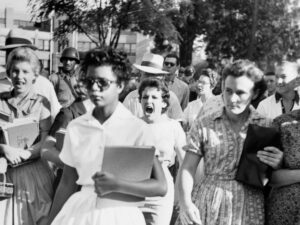[This post was intended for the week before Christmas, but was delayed because of email service issues. If you get this, it means the issues are resolved — ha ha!]
The desegregation storm of September 1957 ripped into Little Rock’s self-image of Southern racial moderation and plunged the city into turmoil for nearly two years. The Central High crisis became the most defining chapter in Little Rock’s history.” ~ Arkansas Democrat Gazette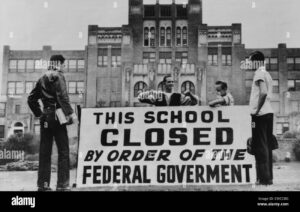
I first heard of Central High School in Little Rock, Arkansas was while eating a bowl of oatmeal. Two things I could always count on in the morning: Mom making oatmeal and listening to the news.
The reports coming in the fall of 1957 were of nine Black students having trouble, big trouble, enrolling in an “all white” high school.
I remember asking Mom,
What is a white school?
What color is our school?
What color was your school?
And reports were ever more scary and ever more confusing.
Why were people acting so mean?
What had these kids done?
Could this happen at St. Anne’s School?
My eight-year-old mind could process — none of it.
At the time I had no way of understanding why, of all things, the National Guard was needed to walk these students to school.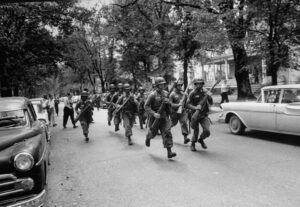
So Mom decided it was time to give her children a history lesson and a civics lesson wrapped up in a morality story.
Her textbook was The Adventures of Huckleberry Finn.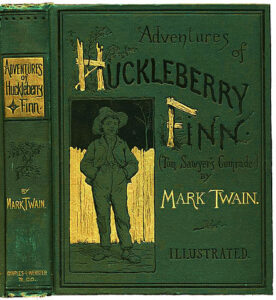
Back then Mom read to us at bedtime. And Huckleberry Finn hooked us from the get-go.
Huck was running away from his abusive father and his friend, Jim, was running from his slave master. The two of them set off on a homemade raft down the Mississippi River.
I imagined myself on that raft fleeing the third grade.
I learned in their story how white people at one time enslaved Black people and how it was against the law, even a sin, to help a Black person escape.
So Huck was in big trouble.
For helping Jim he could be sent to jail and even — hell.
So as the story unfolds, Huck, in a fit of sanctimonious remorse, writes a letter to the authorities confessing his sin, promising to turn Jim in.
But he never sends it.
The idea of turning in his friend doesn’t sit well. Huck’s conscience burned in the opposite direction.
He cared so much for his good and faithful friend. Jim was his brother.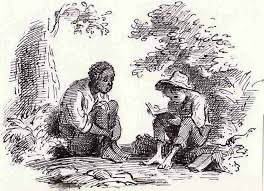
Huck tells his story:
I felt good and all washed clean of sin for the first time I had ever felt so in my life, and I knowed I could pray now. But I didn’t do it straight off, but laid the paper down and set there thinking – thinking how good it was all this happened so, and how near I come to being lost and going to hell.
And went on thinking:
And got to thinking over our trip down the river; and I see Jim before me, all the time; in the day, and in the night-time, sometimes moonlight, sometimes storms, and we a floating along, talking, and singing, and laughing.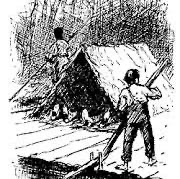
But somehow I couldn’t seem to strike no places to harden me against him, but only the other kind.
I’d see him standing my watch on top of his’n, stead of calling me, so I could go on sleeping; … and do everything he could think of for me, and how good he always was; and at last I struck the time I saved him by telling the men we had smallpox aboard, and he was so grateful, and said I was the best friend old Jim ever had in the world, and the only one he’s got now; and then I happened to look around, and see that paper.
It was a close place. I took it up, and held it in my hand. I was trembling because I’d got to decide, forever, betwixt two things, and I knowed it. I studied a minute sort of holding my breath, and then says to myself,
“All right, then, I’ll go to hell” — and I tore it up.
Jubilee!!!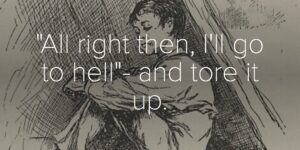
When Mom read that line my heart leaped for joy. I just knew he’d done the right thing.
At that moment my own conscience was born.
When Huck decided to follow his moral compass I recognized I had one, too, and that at some point I too might be challenged to follow it.
The truth is sometimes when you go with the flow you end up in the sewer.
Mom helped us understand the significance of those students in Little Rock running the gauntlet each morning in the fall of 1957.
Doing the right thing sometimes requires — a walk through hell.
Just a thought…
Pat
Copyright © 2023 Patrick J. Moriarty. All Rights Reserved.

